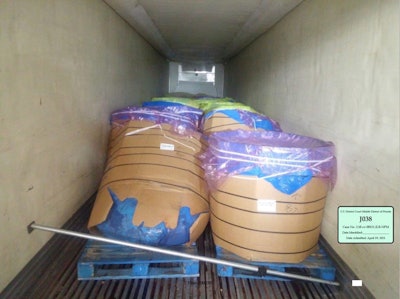
During the week of Aug. 23, a Florida federal court issued an extensive 59-page opinion and order in a five-year saga over a cargo claim involving a truckload of beef that shifted in transit. The decision in Scotlynn USA Division v. Titan Trans provides guidance on important legal issues for the trucking industry.
The Players: The motor carrier was Titan Trans. The shipper was FPL Foods in Georgia. The receiver was Cargill’s meat processing plant in Wisconsin. The broker was Scotlynn USA Division, who brought the lawsuit against Titan Trans.
The Shipment: On September 21, 2016, a driver for Titan Trans picked up a full truckload of fresh beef from FPL’s facility in Georgia for delivery to Cargill’s processing facility in Wisconsin. Scotlynn USA Division, who had a contract with Cargill, brokered the load.
FPL loaded the 21 combos (corrugated board boxes) of beef onto the trailer and secured it. Titan’s driver only viewed the loaded beef from the rear of the trailer as the doors were being closed.
The Claim: During the trip, some of the combos tipped forward inside Titan’s trailer. Some of the combos broke, but there was no evidence the inner plastic lining was punctured or that the beef was exposed. The combos simply shifted forward.
When Cargill received the load on a Friday afternoon (September 23, 2016), it saw the shifted boxes and rejected the entire load. Cargill did not inspect the load except to take a few photos.
With the fresh beef rejected and still on Titan’s trailer, things got even more interesting. FPL agreed to receive the beef back for re-packaging. Titan’s driver, however, could not leave Wisconsin for Georgia with the beef until the following Monday (September 26, 2016). His FMCSA hours of service were up and no other Titan driver was available.
Scotlynn, as the broker, handled the aftermath. In directing the return, Scotlynn did not realize that the beef needed to be re-packaged quickly due to shelf life. Scotlynn asked Titan to hold the $90,000 of fresh beef on its refrigerated trailer over the weekend and take the beef back on Monday. Scotlynn did not tell Cargill or FPL this plan.
On Monday, September 26, 2016, FPL was surprised to learned that the beef had not yet left for Wisconsin. FPL told Scotlynn not to bother because the beef would be too old. Once FPL rejected the return of the beef, Scotlynn declared a total loss and claimed Titan for the roughly $90,000 loss.
Stuck with the beef, Titan’s insurer found a salvager, but the salvage value was minimal at that point.
A lawsuit ensued.
The Lawsuit: Scotlynn sued Titan in federal court in Florida (where Scotlynn is headquartered). Scotlynn brought the claim “on assignment” from Cargill, who had supposedly paid FPL for the beef and bore the loss. For three years, the case wound its way through the court and ended with a three-day trial, conducted entirely virtual via Zoom, in April 2021, before Judge John Badalamenti of the District Court for the Middle District of Florida.
The End: Judge Badalamenti ruled in favor of Titan in several ways and denied Scotlynn’s claim entirely. His detailed decision provides guidance on the full cycle of issues in a suit for cargo loss, including taking responsibility for loading and security cargo, handling the rejection of a shipment, inspecting and assessing damages, and mitigating damages. While the zero-verdict obtained by the defense is important, the takeaways from Judge Badalamenti’s decision should be of longer lasting importance to carriers, shippers, receivers, transportation brokers, and the transportation industry at-large.
Takeaway #1: You can’t win a cargo claim unless you show the amount of loss
The broker tried to prove a cargo claim, but it never showed how much of the beef was actually lost. To prevail on cargo claim against a motor carrier under the Carmack Amendment (49 U.S.C. § 14706), the claimant (typically the shipper or the transportation broker on assignment from the shipper) must prove all three: (1) it delivered the goods to the motor carrier in good condition; (2) the goods were delivered in a damaged condition; and (3) the amount or value of the damage to the goods. The Carmack Amendment claim fails if any of these elements are missing. In this case, Scotlynn missed the third part—it did not show the amount of its alleged damages. Although the beef was technically damaged because it arrived shifted, the fact that FPL agreed to accept it for re-packaging showed at least some of the beef was still good. The broker lost because it did not show the amount of lost beef, if any.
Takeaway #2: Be careful if you load and secure the cargo—it may be your responsibility
While motor carriers are typically responsible for the condition of the goods they move, this is not always the case. Titan proved in this case that the shipper FPL had loaded and secured the beef. It did not matter that “shipper load and count” was not on the bill of lading. The evidence showed it was FPL’s responsibility. Expert testimony supported the errors FPL made in loading the beef. Titan’s attorneys then proved at trial that the driver was not negligent in transporting the beef. Hard braking may occur during normal transit. Nothing showed the driver was extreme or careless. With all driving being normal, and FPL having loaded and secured the beef, the responsibility fell on FPL, the shipper and not on Titan.
Takeaway #3: Mitigate damages
When Cargill saw the beef had shifted, it was not lawful to declare a total loss and make the carrier handle it. The carrier’s responsibility ended when it delivered the goods—regardless of whether they were in good or bad condition—as long as they were not “totally worthless.” And this beef was anything but worthless. FPL had agreed to reprocess it. Importantly, the judge wrote that the broker and receiver were responsible for knowing how to properly take care of the beef after it was rejected for shifting. This included knowledge of shelf life. Judge Badalamenti was critical of the shipper and broker’s “stumbling actions” during the salvage efforts, and he ruled that these miscommunications and errors in the hours after the rejection caused the situation to go from bad to worse, placing responsibility on Scotlynn not Titan.
Trucking law is not the model of clarity, but there is plenty of guidance to be taken from Judge Badalamenti’s decision regardless of your role in the supply chain. While some of those takeaways may be simple and obvious—mitigate your damages and communicate clearly with your transportation partners—it is often good to be reminded of the basics. It just might keep you from spending an extraordinary amount of time and energy litigating over some slightly shifted beef. For those interested, a copy of the decision is available here.
The authors of this article are Kristen MJ Johnson, Partner, and John L. Marchione, Senior Associate, at Taylor & Associates, Attorneys at Law, PL.











